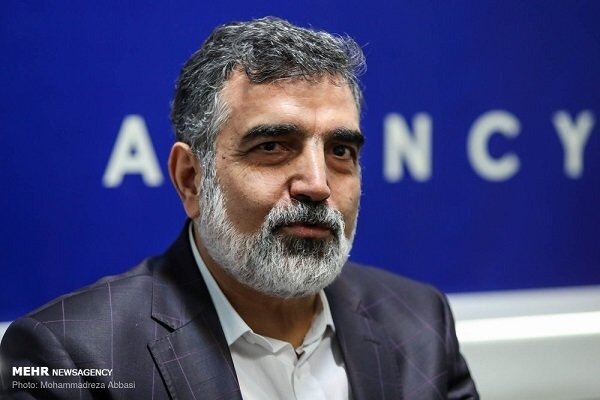Karaj centrifuge-producing plant is not subject to Safeguards Agreement: Iran

TEHRAN – An official from the Atomic Energy Organization of Iran (AEOI) said on Thursday that production of centrifuges at the Karaj nuclear facility is not subject to Safeguards Agreement because there is no nuclear material there.
“At the Karaj nuclear facility, we don’t have nuclear material, and that’s why the site is not subject to the Safeguards Agreement,” AEOI spokesman Behrouz Kamalvandi told the national TV.
Kamalvandi also said Iran does not need permission from anyone to produce centrifuges.
Iran is entitled to producing advanced centrifuges without having to endure any limits under Article 4 of the Non-Proliferation Treaty (NPT), he explained.
The comments by Kamalvandi came two days after International Atomic Energy Agency (IAEA) director general Rafael Grossi visited Tehran for talks with AEOI chief Mohammad Eslami and Foreign Minister Hossein Amir Abdollahian. The visit took place as Iran and the parties who signed the 2015 nuclear deal are set to resume talks on September 29 to discuss ways to lift illegal sanctions on Iran.
“We produce centrifuges there. They say Iran is producing advanced centrifuges in the Karaj facility. Yes, we do not shy away from this fact,” Kamalvandi said, Press TV reported.
He added, “Thanks God, we are able to produce such centrifuges at a high capacity, and we do not get permission from anyone for this.”
The nuclear spokesman also criticized the IAEA over its prejudiced approach toward Iran’s civilian nuclear program, saying the United Nations’ nuclear agency is under the influence of certain Western countries.
While in Tehran Grossi said he sought common grounds to “deepen mutual cooperation” between the IAEA and Iran, describing the Tehran talks as “very constructive”.
The United States is first and foremost responsible for the situation surrounding the nuclear deal, officially called the Joint Comprehensive Plan of Action (JCPOA).
In May 2018, former U.S. president Donald Trump quit the nuclear deal and returned sanctions lifted under the pact and added new ones. Trump did this despite the fact that Iran was fully honoring its commitments under the JCPOA.
Trump even introduced a total oil embargo against Iran under his “maximum pressure” campaign against Iran.
When Trump officially abandoned the JCPOA in May 2018, his top diplomat Mike Pompeo said the U.S. will impose “the strongest sanctions in history” on Iran. Also in November 2018, John Bolton, who was the White House national security advisor at the time, said, “It’s our intention to squeeze them (Iranians) very hard… until the pips squeak.”
Through this action the U.S. violated UN Security Council Resolution 2231 that has confirmed the JCPOA.
Seeing no action on the part of the European parties to the nuclear pact, Germany, France and Britain (European trio or E3) in particular and the European Union in general, to compensate Iran for the illegal sanctions in May 2019 Iran said its strategic patience is over and started to gradually remove some bans on its nuclear activities in accordance to paragraph 36 of the JCPOA which has provided “a mechanism to resolve disputes and allows one side, under certain circumstances, to stop complying with the deal if the other side is out of compliance.”
Now that the nuclear talks are set to be resumed on Monday after a five-month hiatus due to the June presidential election in Iran in which a new government come to power, officials in Tehran have called on the IAEA to refrain from politicizing technical matters that could derail the talks to revive the JCPOA.
“It is a fact that the IAEA has not treated Iran as it should,” Kamalvandi said. “We have been constantly pointing this out and issued warnings.”
Nevertheless, he said, Iran has continued to strive and secure its rights and reveal that the claims by the West that Iran was seeking to produce nuclear weapons are unsubstantiated.
“Of course, they ultimately want to say, ‘because Iran is looking for a nuclear weapon, it must not acquire a nuclear weapon,’” he said, adding that Tehran, despite knowing that the IAEA is under the influence of big powers, will not stop its cooperation with it.
In an escalation just a few days before the resumption of the nuclear talks in Vienna, the U.S. threatened on Thursday to confront Iran at the IAEA next month if it does not cooperate more with the IAEA.
“If Iran’s non-cooperation is not immediately remedied ... the Board will have no choice but to reconvene in extraordinary session before the end of this year in order to address the crisis,” U.S. chargé d’affaires in Vienna Louis Bono said at an IAEA Board of Governors meeting.
Bono claimed that Iran "has still not provided the necessary cooperation, even after extensive attempts by the [IAEA] director general to develop a constructive relationship with Iran’s new leadership.”
He said the U.S. was “deeply disappointed that Iran refused to take the opportunity presented by (Grossi’s) visit to make progress on the long list of urgent outstanding issues before the Agency.”
On Thursday, Iranian Foreign Ministry spokesman Saeed Khatibzadeh lamented that ahead of the Vienna talks the United States and the European troika “issue bogus statements, add sanctions, conjure distorted narratives and keep mum on Israel’s threats” to launch military strikes on Iran’s nuclear facilities.
Khatibzadeh added that Iran has formed “a high-level negotiating team and calls for a quick good deal and full implementation of the JCPOA” based on UN Security Council Resolution 2231.
